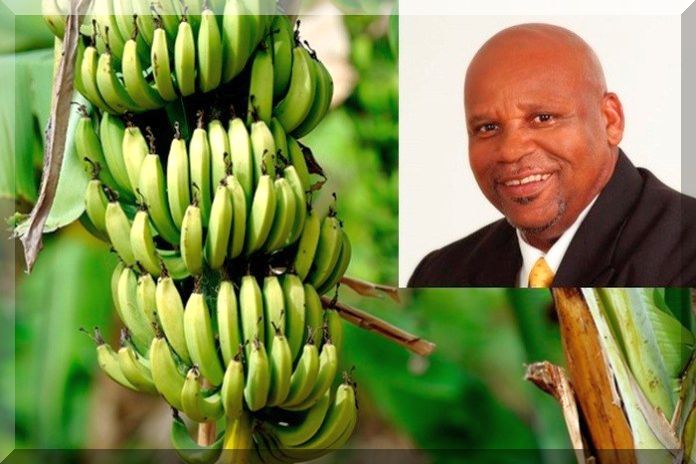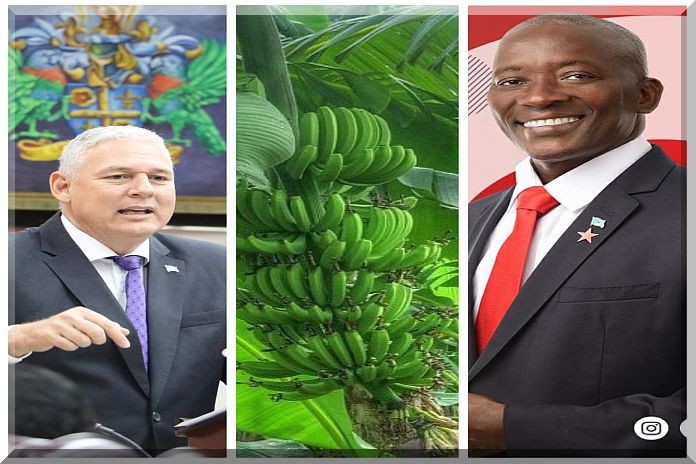By Caribbean News Global ![]()
TORONTO, Canada – The docile levity of Allen Chastanet’s rant about bananas on social media has aroused the sleeping tigers from an era before the infamous Chastanet, to draw reality and common sense into the equation that requires a full-scale inquiry, into the previous administration’s incompetence.
Enough is Enough by Cassius Elias (Pages 298 -335) is a recommended read on Bananas – A brief synopsis of the Banana Industry in St Lucia.
But first, the previous administration in dreaming up scapegoats, said it prioritized agriculture as part of “our medium-term development strategy,” focused on the following areas:
- Expansion of Acreage under cultivation.
- Pest and disease control.
- Increased productivity of banana farms.
- Establishment of a Sustainable Finance m Mechanism for inputs.
“Our banana farmers are now left out in the cold, amidst increasing concern about our cocoa production and the future of the seven-crop program. Based on reports, the UWP is immensely concerned about the immediate future of National Fairtrade Organization, widely reported to be on the verge of collapse,” according to Chastanet’s rant on social media. “Our efforts included working closely with Taiwanese and simultaneously focusing on the seven-crop program.”
“As far back as the 1970s, in the time of Sir John Compton, the Labour Party has treated the banana industry as a political football. The undeniable truth is that throughout the mid-70s and the 1990s, the strategists of the labour party concentrated on encouraging farmers to fight among themselves at their own expense and at great cost to the nation’s economy. Finally, on the advice of one prime minister, the farmers gave up on bananas in favour of investing in vehicles to service the tourism industry, only to be betrayed by the same Saint Lucia Labour Party (SLP) government,” he continued.
“Fast forward to more recent times. After consistently attacking the United Workers Party (UWP) plans for revitalizing the sector, the Philip J. Pierre administration convinced local farmers that they had somehow stumbled upon a new way forward. The truth soon hit home that once again the resilient banana producers have been kicked in the teeth by the SLP, this time led by Pierre and his agriculture minister Prospere. Their notorious incompetence has resulted in the death of a March 2021 arrangement negotiated by the Allen Chastanet administration to ship bananas to a supermarket chain in the UK,” Chastanet said.
UK suspends Banana trade
The UK suspended banana trade with Saint Lucia as announced by Alfred P. Prospere, minister for agriculture, fisheries, food security and rural development, said:
“In July of 2021 when the Saint Lucia Labour Party (SLP) government came into office, we found a banana industry that had collapsed under the United Workers Party (UWP) government. Banana trade with the UK was halted for two years.”
“The critical infrastructure required to efficiently operate the industry was dismantled. The main banana exporting company WIBDECO/Winfresh Ltd., went into administration. Key assets such as the ripening facility at Stanstead (UK) and Winfresh’s stake in the Geest shipping line were sold off to third parties to meet debt payments.
“This meant that the main components of the banana exporting company such as shipping, marketing, and logistics were lost. The local producer base/farmer’s organization, the NFTO was facing financial losses and technical challenges. They had to immediately assume responsibility for the commercial arm of the trade although they did not have the resources and expertise to adequately perform that role. The situation at the time seems rather bleak,” noted minister Prospere.

Sale of Banana assets
Former minister for agriculture Cassius Elias acknowledge that minister for agriculture Prospere,”secured some contracts from UK supermarkets, but the costs of ripening and shipping were prohibitive. In addition, the sale of banana assets and human resource inefficiencies and incompetence in trade negotiations, Saint Lucia bananas had no influence to leverage. And thus, albeit the efforts of the Saint Lucia Labour Party government and farmers, they had no chance to compete on fruit quality, cost of production, price and the impacts of global challenges,” he continued.
“The reality is that if Chief Executive Officer (CEO) of Winfresh Bernard Cornibert and his board, of which former agriculture, fisheries, physical planning, natural resources and cooperatives, Ezechiel Joseph was a member were not so quick to sell the entire infrastructure in the UK, the industry might have survived.” And, therefore, “The death of the banana industry is squarely on the doorstep of the UWP, hitherto chat, by Saint Lucia’s banana tycoons, that alleged: “If you guys pushed me out, the whole industry is going” and so “the vindictive plan is visible”.

A new vision for Lucian farmers (Green Gold) Enough is Enough page 315, wrote:
“Between 1957 and 1990 Windward Island banana farmers enjoyed an unprecedented level of cash flow that made the descendants of former slave workers on the sugar estates and factories feel like millionaires. Unfortunately, those controlling the industry failed to provide reasonable guidance on how to use their new-found wealth.”
“If the industry is to survive, we need to focus resources on farmers most likely to produce at a more competitive level. However, in pursuing this new enabling policy, we must provide a pension scheme for older farmers who are forced out of the industry, and initiate a diversification strategy that will assist young farmers who are not able to survive, to produce two or three alternative crops for the export market, and a range of crops for domestic consumption. More particularly, there is a need to restrict the importation of food for the hotel sector. Unless this can be properly managed, the young farmers in the country will continue to intensify the growing of marijuana.”
Dreaming up scapegoats
Pat Joseph and I have always complained about the reckless expenditure of Winfresh – from Bananas – the sale of licenses – to the collapse of the industry.
“The banana industry provided Saint Lucian farmers with a cash crop that surpassed all others. More than four decades later, growers are still without insurance, while the fortunes and physical assets of the SLBGA-turned-SLBC have practically all disappeared,” Enough is Enough!
The Philip J. Pierre government must step up and provide the necessary resources and assistance for a full-scale inquiry into the collapse of the banana industry, if not, an excellent case for the Special Prosecutor.
This is justified in the particular interests of banana farmers and their contributions to the country’s economy and now at great cost to the nation’s trade, exports and GDP.
“Output is projected to gradually recover to the pre-pandemic level by 2024, slowed by the impacts of the war in Ukraine and the tightening of global financial conditions. Public and private investments are constrained by weak balance sheets, as well as higher input costs and supply constraints.
“Inflation is projected to rise to 6.4 percent in 2022. The fiscal outlook is challenging due to high public debt and large refinancing needs which lead to financing constraints. Without additional policy measures, public debt is projected to stabilize around 90 percent of GDP in the medium term, limiting the space for public infrastructure and social investments,” IMF.
Banana vs Tourism politics
The main question should have centered on what Saint Lucia wanted from the banana industry. Saint Lucia and the Caribbean ‘had no fixed position’ and thus continue to drift from coal – sugarcane – bananas – tourism.
Then and now – authorities need to understand the nitty-gritty of exclusive concessions – i.e – Paper tigers in an unreal deal!
Conclusion
Government negotiations and policy for investments need to adjust their (un) pacified thinking and practical ability, help create jobs and promote prosperity, and promote Micro, Small & Medium Enterprises (MSME) by promoting growth and development, skills expansion, stimulating economic development.
“It appears that the system of licenses and the income derived from it was not fully appreciated even by governments in more recent times,” Enough is Enough, page 324.





